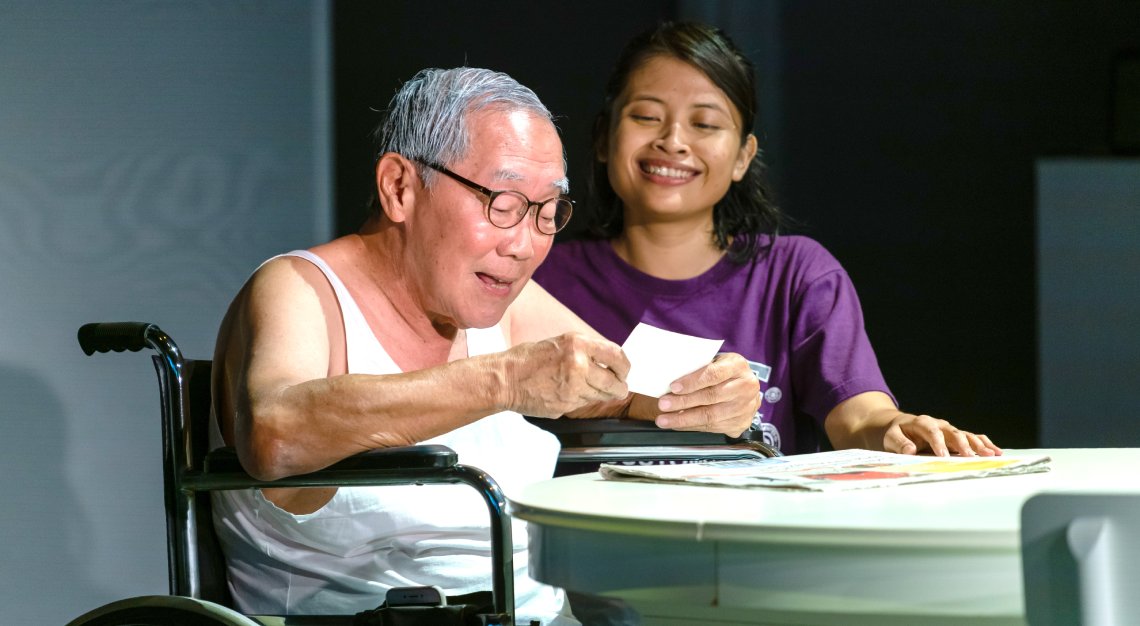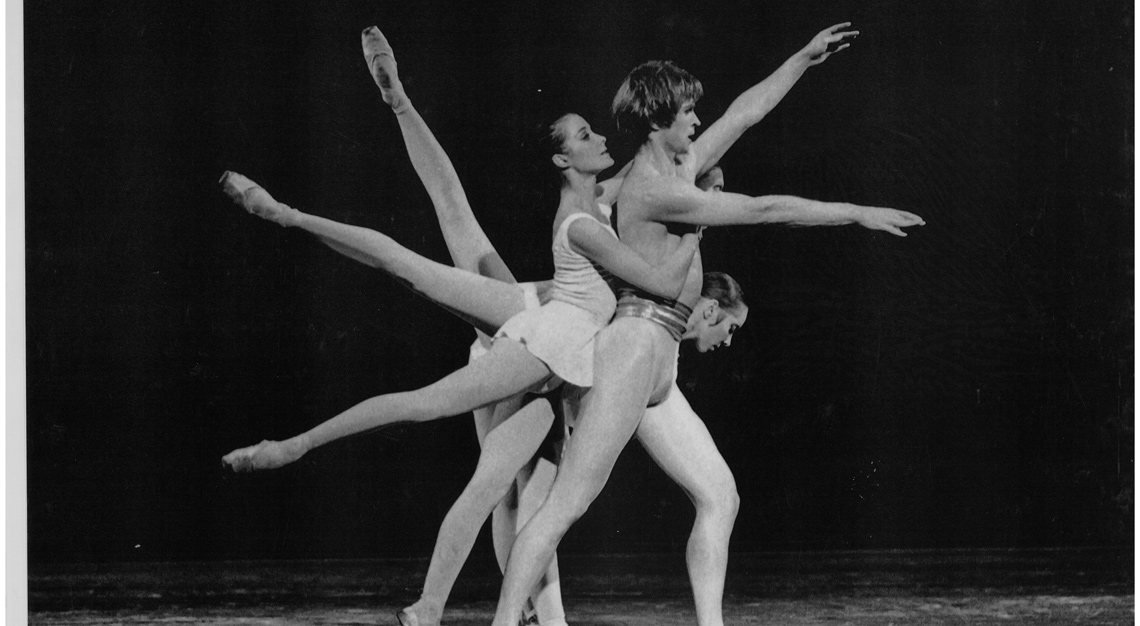Compulsive viewing and lessons in love, care and… privacy. Andrew Leci plays nice, for a change, and leaves a theatre amused, disturbed and very uncomfortable
Watching a television programme (even a film) with my partner is a nightmare. She’s a television producer who knows all the tricks of the trade, often suspending my wonder and disbelief at a piece of televisual art by explaining the ‘cheating’ that goes on and the bad cuts that were missed by the continuity people.
She feels the same way about me when it comes to theatre.
As a former practitioner, I tend to be overly analytical and hypercritical – imagining the choices I might have made for actors and director alike. This is not to suggest that I would have, or could have done anything better. Just differently.
Writing about Wild Rice’s production of Supervision is, therefore, a pleasurable experience, because there is very little that needs changing or doing differently. It was that good. When an audience member leaves a theatre after a performance feeling satisfied, amused and deeply disturbed, the production has done its job.

The plot is relatively simple, and I’ll try to avoid spoilers for those who are lucky enough to get to see it. Teck is a grumpy 71-year-old Singaporean confined to a wheelchair after a stroke, and Yanti is the young Indonesian maid brought in to care for him. Jenny is Teck’s high-functioning, BMW-driving, pre-middle-aged daughter with two kids and a seemingly normal Singaporean life – that is, stressed to the point of distraction. Jenny’s brought Yanti in to look after her father, who can’t look after himself, and the action plays out with the interactions of all three ostensibly stereotypical characters.
But, they’re only stereotypical because the scenario is a relatively common one these days in modern Singapore. According to statistics, by the year 2030, 25 per cent of all Singaporeans will be aged 65 or older, and there are already around a quarter of a million foreign domestic workers taking Sundays off in public places. There will be more. Who knows how many BMW-driving women with two kids taking extra tuition there are across the country? The data is not available, yet. But if I had to hazard a guess, I’d say it’s quite a few.
Playwright Thomas Lim has taken what might be described as a typical backdrop and enriched it with slightly spare but nevertheless sizzling exchanges between the characters that move the narrative along at a pace, and enable the actors to explore their multi-faceted roles. The audience members are forced to ask questions, constantly, especially in terms of how they feel about and interpret the characters in front of them. Jenny appears to be sharp, dictatorial and impatient – she is deeply suspicious of Yanti and treats her with nothing short of contempt – but she’s only doing what’s best for her father, right? She loves him. She cares.

We know that Yanti is a caregiver, a maid, and is more or less responsible for an old man’s life. But here’s the thing – we think we know her because of what she is and not who she is. At the start, we’re almost encouraged to compartmentalise. She’s an Indonesian maid, and we all know what they’re like, right? Jenny certainly does, which is why she has had cameras installed to ‘monitor the situation’. Stories of caregivers abusing their ‘carees’ are legion, we all know that. Of course we never hear about the dedicated domestic workers who make so many people’s lives better because that’s just not ‘news’. But I digress.
We also think we know Teck, at the beginning. He’s been around, done stuff, was part of Singapore’s Pioneer Generation and should be enjoying his retirement. But his lack of mobility leaves him dependent on others and feeling useless – possibly reflecting the degree of hopelessness older people feel as age catches up with them and they are bypassed in a world of increasing technological complexity.
Patrick Teoh’s performance is wonderfully understated and almost consummate in allowing us to witness the existential pain of being old in a world that has an uncomfortable relationship with the concept. I might have asked for a tad more modulation in his performance – a nod, perhaps, to those occasional moments when he could have been sadder, angrier or just more pissed off – but on further reflection, maybe that wouldn’t have been right. The understatement was part of the acceptance. This is his lot. There’s nothing more to give or get excited about – notwithstanding his guilty pleasures; the odd cigarette, food that tastes of something and is therefore bad for him.

Janice Koh’s Jenny is fierce and formidable, popping in from time to time to see how her father’s getting on and, more often than not, admonish Yanti for some infraction or other. While Teck gets to know Yanti – they’re so different they can’t help but bond – Jenny gives the impression that she simply doesn’t want to know Yanti. Why would she? Her employee is there to do a job and nothing more, and this sense of their relationship is incisive in examining the empathy-lacking disconnect that is plaguing society today. Jenny can’t raise a smile. She’s just too damn busy being a ‘tiger mom’ and educating her kids. Acknowledging Yanti as a fellow human being would be… I don’t know… too time consuming and inconvenient.
Many of the plaudits will be reserved for Umi Kalthum Ismail’s portrayal of Yanti. It would have been so easy to drop into caricature, but Lim is far too good a playwright to have allowed that to happen. We’re permitted to have our preconceptions, but they don’t last long. Yanti’s genuine kindness and humanity shine through, even as we accept the fact that she is not where she would choose to be – away from her country, far removed from her family, and having been forced to buy into a contract of scurrilous inequality.

Ismail is excellent, layering her performance with gallows humour interlaced with genuine care and compassion for her charge and a subtlety of response that was both heart-warming and heart-breaking.
Glen Goei’s direction is nigh on masterful. It would have been forgivable to look for moments of potential drama (even melodrama) in this piece, although they would have uncomfortably undermined Lim’s direct, no-nonsense writing – sometimes beautiful in its simplicity. Goei is too good a director, and too sensitive to a playwright’s purpose to have trodden that path. Instead, he lets the situational aspects of the piece speak for themselves, adding gentle, almost pastel-coloured brush strokes to a landscape with which we are all too familiar. Goei respects the intelligence of the audience in this production and eschews the obvious, allowing his characters to subtly ingratiate themselves into our hearts and minds.
I haven’t even touched on many issues that Supervision deals with. It is a rich, complex and stimulating work that asks more questions than it provides answers, which is just as it should be. With a fine, tight script, excellent performances all round and a deft directorial touch, it’s a ‘must see’ production, and a testament to Wild Rice’s commitment to ‘inspire, challenge and entertain.’






